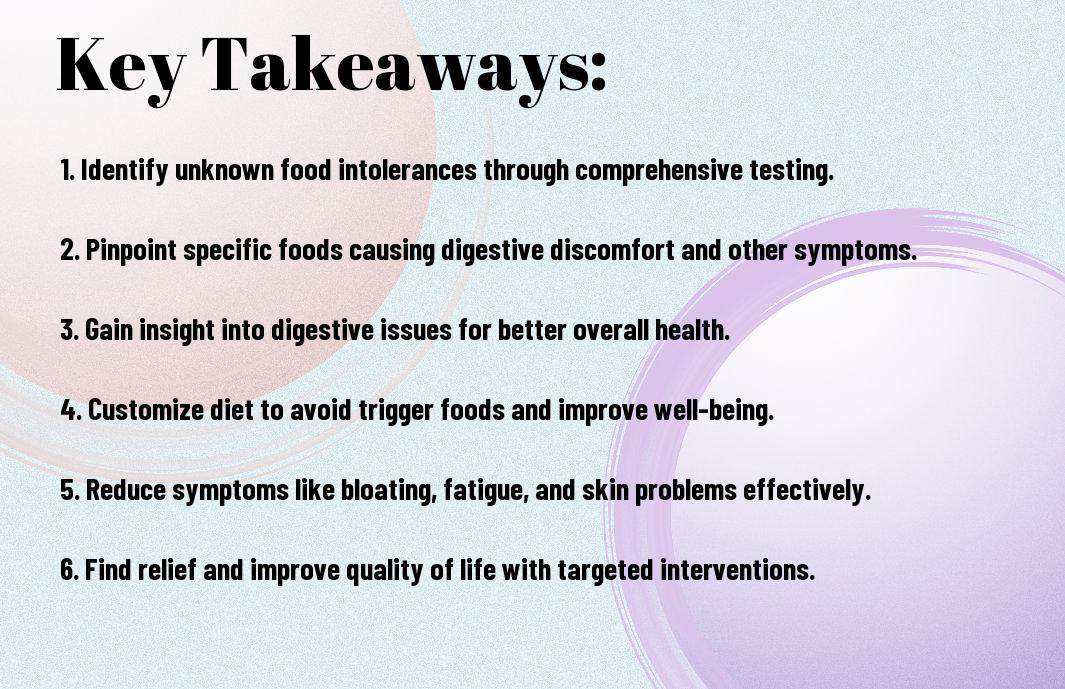Food intolerances can often go undiagnosed, leading to various health issues. A comprehensive test can help identify specific foods causing problems in your body. Understanding your intolerances can positively impact your overall well-being, energy levels, and digestive health. By discovering and addressing these intolerances, you can make informed decisions about your diet and improve your quality of life. Dive into the world of food intolerance testing to unlock a healthier future.
Key Takeaways:
- Food intolerance test: A comprehensive test can help identify specific foods that may be causing digestive issues or discomfort.
- Identifying triggers: The test can pinpoint specific ingredients or food groups that your body may have trouble digesting, allowing you to make targeted dietary changes.
- Improving quality of life: By eliminating problem foods, you can reduce symptoms such as bloating, gas, and stomach pain, leading to an overall improvement in well-being.
- Consulting healthcare professionals: It’s important to consult with healthcare professionals to interpret test results and develop a plan for managing food intolerances.
- Embracing a personalized approach: Understanding your unique food intolerances can empower you to make informed decisions about your diet and improve your overall health.

What Are Food Intolerances?
Definition and Prevalence
On a fundamental level, food intolerances refer to the body’s inability to properly digest certain foods. Unlike food allergies that involve the immune system, food intolerances mainly affect the digestive system. They are quite common, with various studies suggesting that around 15-20% of the global population may have some form of food intolerance.
Common Types of Food Intolerances
One of the most well-known types of food intolerance is lactose intolerance, where individuals have difficulty digesting lactose, the sugar found in milk and dairy products. Another common form is gluten intolerance, also known as celiac disease, which causes an adverse reaction to gluten-containing grains like wheat, barley, and rye. Fructose intolerance, histamine intolerance, and sulfite sensitivity are also prevalent forms of food intolerance.
| Lactose Intolerance | Difficulty digesting lactose |
| Gluten Intolerance | Adverse reaction to gluten-containing grains |
| Fructose Intolerance | Difficulty digesting fructose |
| Histamine Intolerance | Response to high-histamine foods |
| Sulfite Sensitivity | Reaction to sulfites in certain foods |
Food intolerances can lead to a range of symptoms such as bloating, stomach pain, diarrhea, skin rashes, and fatigue. Identifying and managing these intolerances is crucial for improving overall health and well-being.
Symptoms of Food Intolerances
Gastrointestinal Issues
With gastrointestinal issues, individuals may experience symptoms such as bloating, gas, diarrhea, or constipation after consuming certain foods. These discomforts can be indicators of food intolerances, where the body has difficulty digesting specific components in the food.
Skin Problems
One of the common signs of food intolerances is skin problems like rashes, eczema, or acne. These skin conditions can be exacerbated by the consumption of trigger foods, causing inflammation and discomfort.
This can lead to chronic skin issues that are challenging to treat without identifying and eliminating the root cause, which may be a food intolerance.
Energy and Mood Changes
Skin changes related to food intolerances can manifest as dull, tired-looking skin, or even dark under-eye circles. These physical symptoms can be accompanied by mood changes like irritability, anxiety, or fatigue.
Understanding how food intolerances impact your body is vital for maintaining overall well-being and identifying trigger foods. By recognizing the symptoms and making necessary dietary adjustments, individuals can improve their quality of life and avoid potential health risks associated with untreated food intolerances.

The Importance of Testing
Despite the growing awareness of food intolerances, many individuals still struggle to pinpoint the specific foods causing their symptoms.
Why Self-Diagnosis Isn’t Enough
On the surface, self-diagnosing food intolerances may seem straightforward. However, the reality is much more complex. Symptoms of food intolerances can be subtle and easily mistaken for other health issues. Without proper testing, individuals may eliminate vital nutrients from their diet unnecessarily, leading to nutritional deficiencies and other health complications.
The Benefits of Professional Testing
Importance of seeking professional testing cannot be understated. While elimination diets and self-assessment tools are available, they often provide inconclusive results and may not be accurate. Professional testing, such as comprehensive food intolerance tests administered by healthcare providers, can provide definitive answers and guide individuals toward the most effective dietary changes.
The benefits of professional testing extend beyond simply identifying problem foods. These tests can pinpoint specific intolerances, assess the severity of reactions, and offer personalized recommendations for managing symptoms. Seeking professional help can save individuals time and frustration by providing clear guidance on how to effectively address their food intolerances.
How Comprehensive Food Intolerance Tests Work
Many individuals are turning to comprehensive food intolerance tests to identify potential triggers for their digestive issues, skin problems, or other health concerns. These tests analyze your body’s response to various foods by measuring specific antibodies in your blood, providing valuable insights into which foods may be causing inflammation or other negative reactions in your system.
Types of Tests Available
- IgG Testing: Measures levels of IgG antibodies to identify food intolerances.
- IgE Testing: Detects immediate allergic reactions to foods.
- Combined Testing: Comprehensive analysis of both IgG and IgE responses.
- Elimination Diet: A test where you eliminate suspected foods and then reintroduce them to observe reactions.
- Genetic Testing: Identifies genetic predispositions to food intolerances.
Perceiving patterns in your body’s responses to different foods can help you make informed decisions about your diet and overall health.
| The | Testing Process |
| Duration | Varies depending on the type of test |
| Results | Usually available within 1-2 weeks |
| Follow-up | Consultation with a healthcare provider recommended |
| Benefits | Identifies specific triggers for potential health issues |
What to Expect During the Testing Process
Comprehensive food intolerance tests typically involve a blood draw or saliva sample to analyze your body’s immune response to various foods. For instance, IgG testing measures antibody levels to assess your tolerance to specific foods. The results can reveal important information about which foods may be causing inflammation or other negative reactions in your body, helping you make positive changes to your diet for better health.
Interpreting Test Results
After undergoing a food intolerance test, the next step is interpreting the results. Various tests are available, ranging from blood tests to hair analysis. According to Food intolerance tests: reliable or a money-grabbing scam?, it is imperative to be cautious and discerning when interpreting the test results, as some tests may not be scientifically validated.
Understanding Your Test Report
Any food intolerance test report should provide detailed information on the specific foods or substances that trigger a reaction in your body. The report may indicate the degree of intolerance or sensitivity to each item tested. It is crucial to carefully review and understand the results to make necessary dietary adjustments.
Identifying Triggers and Sensitivities
To effectively manage food intolerances, it is vital to identify the triggers and sensitivities that cause adverse reactions in your body. This process involves eliminating potential culprits from your diet and reintroducing them systematically to pinpoint the root cause of your intolerance. Identifying these triggers can significantly improve your overall health and well-being by preventing uncomfortable symptoms.
Creating a Personalized Diet Plan
Now, once you have identified your food intolerances through a comprehensive test, the next step is to create a personalized diet plan that works for you. This involves eliminating trigger foods from your diet and finding suitable alternatives to ensure you are still getting the necessary nutrients.
Elimination Diets and Rotation Diets
For some individuals, elimination diets can be a helpful method to pinpoint specific food intolerances. By removing one or more suspected trigger foods from your diet for a period of time and then reintroducing them, you can observe how your body reacts and identify any adverse effects. On the other hand, rotation diets involve rotating different foods to prevent the immune system from becoming overly sensitive to particular ingredients, providing a more varied diet while managing food intolerances.
Working with a Healthcare Professional
Professional guidance is necessary when creating a personalized diet plan based on your food intolerances. Working with a healthcare professional, such as a dietitian or nutritionist, can help you navigate the complexities of food intolerances and ensure you are meeting your nutritional needs. They can provide expert advice on alternative ingredients, meal planning, and supplementation, offering a tailored approach to managing your specific intolerances.
For instance, a healthcare professional can conduct further testing if needed, such as blood tests or stool tests, to determine the extent of your food intolerances and pinpoint any underlying issues. They can also offer ongoing support and guidance as you make changes to your diet, helping you track your progress and adjust your plan as needed.
To wrap up
To conclude, discovering your food intolerances through a comprehensive test can greatly improve your quality of life by pinpointing specific triggers that may be causing discomfort or health issues. By eliminating these problem foods from your diet, you can experience relief from symptoms and improve your overall well-being. It is vital to consult with a healthcare professional or nutritionist to interpret the test results accurately and develop a personalized plan for managing your food intolerances.
Recall, understanding your body’s response to different foods is a key step towards optimizing your health and feeling your best. Investing in a comprehensive food intolerance test can provide valuable insights that can guide your dietary choices and lead to a happier, healthier life in the long run.
FAQ
Q: What is a comprehensive test for discovering food intolerances?
A: A comprehensive test for discovering food intolerances is a thorough examination that analyzes your body’s reaction to a variety of foods to identify any intolerances or sensitivities.
Q: How can a comprehensive test help in identifying food intolerances?
A: By conducting a comprehensive test, you can pinpoint specific foods that may be causing adverse reactions in your body, such as bloating, headaches, or skin issues, ultimately aiding in developing a suitable dietary plan.
Q: What are the common symptoms of food intolerances?
A: Common symptoms of food intolerances include digestive issues like bloating, gas, diarrhea, as well as skin problems, fatigue, and headaches after consuming certain foods.
Q: How can food intolerances impact overall health and well-being?
A: Untreated food intolerances can lead to chronic inflammation, nutrient deficiencies, digestive disorders, and other health issues, affecting one’s overall well-being and quality of life.
Q: Is it necessary to consult a healthcare professional before taking a comprehensive test for food intolerances?
A: Yes, it is highly recommended to consult a healthcare professional before undergoing a comprehensive test for food intolerances to ensure proper guidance, accurate interpretation of results, and appropriate follow-up steps based on the findings.



